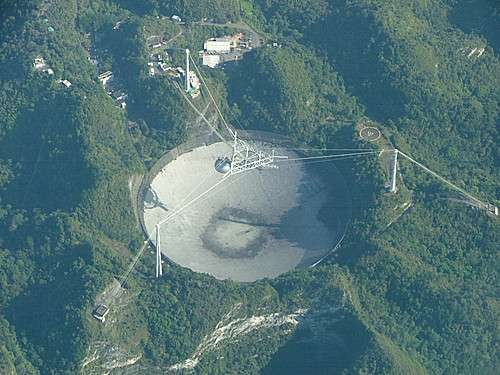China's FAST Telescope Will Listen To Sounds From The Universe
China's <a href="https://www.crazyengineers.com/threads/worlds-largest-radio-telescope-getting-ready-in-china-by-2016.81799">World's Largest Radio Telescope Getting Ready In China By 2016</a> will have the capability of listening to the sounds originating from distant places in the Universe, reports <a href="https://timesofindia.indiatimes.com/home/science/China-telescope-can-be-sensitive-ear-to-sounds-from-universe/articleshow/48309136.cms" target="_blank" rel="noopener noreferrer">China telescope can be 'sensitive ear' to sounds from universe - Times of India</a>. The telescope, currently under construction among the mountains of Guizhou province, is slated to become the world's largest of its kind upon completion and it will be able to decode all the cosmic signals and messages, essentially acting as Earth's 'Big Sensitive Ear'. In case you missed our earlier coverage of FAST, it's a big-ass telescope of the size of about 30 football grounds.
At present, various teams comprising of engineers, technicians and scientists are busy assembling the reflector of the telescope. The reflector is about half a kilometer in diameter, comprising of about 4450 panels. Each of this panel is of the shape of an equilateral triangle (all sides equal, if you remember) with sides measuring 11 meters each.

The location of the telescope will pay a major role in FAST's ability to detect sounds from distant Universe. There are no villages or towns in the nearby area - and hence the interference with the local radio frequencies will be minimum. This telescope will be way more sensitive than existing ones and it will help us capture very weak signals.
China will commence several science projects with FAST in action. Nan Rendong, the chief scientist of the FAST Project said that China will be able to do large-scale observations for the HI emissions from distant galaxies. This observation will be crucial for understanding the state of dark energy and also help calculate the speed at which our Universe is expanding.
Researchers are expecting to discover breakthrough information about pulsars, the rotating neutron stars that are known to emit beam of electromagnetic radiation. FAST will be able to catch these beams and detect about 7000 pulsars in our Milky Way in about a year.
Of course, one of the major objectives of FAST will be to find out aliens in the Universe and figure out if they are sending any mystery signals to us. Of course we'll keep you posted about all the new, exciting discoveries that FAST makes.
At present, various teams comprising of engineers, technicians and scientists are busy assembling the reflector of the telescope. The reflector is about half a kilometer in diameter, comprising of about 4450 panels. Each of this panel is of the shape of an equilateral triangle (all sides equal, if you remember) with sides measuring 11 meters each.

The location of the telescope will pay a major role in FAST's ability to detect sounds from distant Universe. There are no villages or towns in the nearby area - and hence the interference with the local radio frequencies will be minimum. This telescope will be way more sensitive than existing ones and it will help us capture very weak signals.
China will commence several science projects with FAST in action. Nan Rendong, the chief scientist of the FAST Project said that China will be able to do large-scale observations for the HI emissions from distant galaxies. This observation will be crucial for understanding the state of dark energy and also help calculate the speed at which our Universe is expanding.
Researchers are expecting to discover breakthrough information about pulsars, the rotating neutron stars that are known to emit beam of electromagnetic radiation. FAST will be able to catch these beams and detect about 7000 pulsars in our Milky Way in about a year.
Of course, one of the major objectives of FAST will be to find out aliens in the Universe and figure out if they are sending any mystery signals to us. Of course we'll keep you posted about all the new, exciting discoveries that FAST makes.
0
